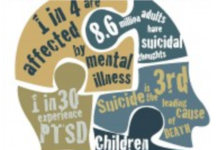“Veterans Let Slip the Masks of War: Can This Art Therapy Ease PTSD?”
“Service members suffering from PTSD often feel like they’re wearing a mask,” Samantha Allen writes in Invisible Wounds. Melissa Walker, an art therapist, asks them to make one. “The results are stirring. One mask, striped in red and black with hollow chrome-colored eyes, is wrapped in razor wire with a lock where its mouth should be.”
First-Person Accounts of Madness and Global Mental Health: An Interview with Dr. Gail Hornstein
Dr. Gail Hornstein, author of Agnes’s Jacket: A Psychologist’s Search for the Meanings of Madness, discusses the importance of personal narratives and service-user activism in the context of the global mental health movement.
Non-Medical Treatments for PTSD Effective, Study Suggests
Group-based MBSR and PCGT therapies effective as a complementary treatment for PTSD.
I Took My First Antidepressant, and the Effects Were Frightening
In this opinion piece for The Guardian, Deborah Orr tells of her frightening experience with intense disassociation that occurred after starting an antidepressant.
Article →
Study Finds Increasing Minimum Wage can Decrease Child Maltreatment
Increasing the minimum wage - even modestly - can lead to less cases of child abuse in the home.
How Survivors are Finding Strength in Martial Arts
From Love Fighting Hate Violence: For many women, participation in Muay Thai and other martial arts can play a major role in healing from sexual violence...
AI-Controlled Brain Implants for Mood Disorders Tested in People
From Nature: Two teams funded by the US military's research arm, the Defense Advanced Research Projects Agency (DARPA), have begun preliminary trials of brain implants...
Using Paint, Pen on Paper or Song to Revisit Trauma
From The Conversation: The literary, visual, and performing arts can play an important role in helping people process trauma, especially for those who have difficulty...
Minority Discrimination Linked to Psychosis
A study published in this month’s issue of the Social Psychiatry and Psychiatric Epidemiology found that perceived discrimination related to minority status may precede...
What if ACEs (Adverse Childhood Events) Were the Basis of Mental Health Treatment?
What would happen if the mental health system fully recognized the pervasive and profound impacts of trauma on their clients? How might a deeper appreciation of the multi-faceted sequelae of childhood maltreatment and toxic stressors reshape mental health services? While the implementation of trauma-informed care in mental health programs has made significant inroads, the dominant bio-reductionist model continues to constrain and undermine progress.
What If We Are All Wrong About Mental Illness?
From Thoughtful Living: The biomedical model of psychiatry, along with the DSM, is deeply flawed and can often be misleading. To improve, mental health services...
Turns out Action Video Games Really can Harm Your Brain
From Global News: According to a recent Montreal study, habitually playing action video games can lead to grey matter loss in the hippocampus, which is...
Mental Health, Inc.
From Kirkus Reviews: In his new book Mental Health, Inc., Art Levine reports on the dire state of the U.S. mental health system.
"The author delivers the...
Pentagon Study Links Prescription Stimulants to Military PTSD Risk
A new study suggests that service members who take stimulant medications to stay alert are five times more likely to suffer from post-traumatic stress disorder, the LA Times reports. “Those who had been prescribed multiple stimulants and the biggest supplies of the drugs were the most likely to have PTSD.”
DSM IV & V Identify Different Groups of Veterans with PTSD
Walter Reed Army Institute of Research psychiatrists have found that many different veterans have Posttraumatic Stress Disorder depending on whether the criteria from the...
This is Solitary
In this piece for The Atlantic, Natalie Chang explores the devastating psychological trauma of solitary confinement.
"That is the legacy and the cost of solitary confinement: The...
How Severe, Ongoing Stress Can Affect a Child’s Brain
From AP News: In response to research showing the long-term health impact of adverse childhood experiences, pediatricians, mental health specialists, educators and community leaders are...
“Can psychedelic trips cure PTSD and other maladies?”
The Washington Post explores some of the history of research into the therapeutic potentials of even just one session with a psychedelic drug, and...
Ambushed by Antidepressants for 30 Years
They helped me function for a while, but the debilitating side effects of antidepressants held me prisoner. I'm still having a hard time understanding how this could have happened. It's been suggested to me by a therapist that what I'm going through now is another kind of PTSD: the ongoing trauma of realizing what antidepressants did to me for 30 years.
Psychodynamic Therapy Revealed to be as Efficacious as Cognitive Behavioral Therapy
Meta-analytic study finds that psychodynamic therapy outcomes are equivalent to those of CBT and other empirically supported treatments.
Agency and Activism as Protective Factors for Children in the Gaza Strip
Researchers recommend a ‘politically-informed focus', including activism, when assessing children and designing interventions in areas of chronic political violence.
Brief Trauma-Focused Psychotherapies Effective for Children with PTSD
Eye Movement Desensitization and Reprocessing Therapy and Cognitive Behavioral Writing Therapy both reduce PTSD symptoms in children who experienced a single traumatic event.
Popular Drug Reveals the Issue of “Off-Label” Use
From The Washington Post: Despite major lawsuits and detailed reports pertaining to severe health risks associated with the antipsychotic Seroquel, the drug remains one of...
Petition: Protect PTSD Treatments That Work!
The American Psychological Association recently issued a guideline recommending only short-term, structured, and symptom-focused therapies for the treatment of PTSD; the guideline may be...
“Post-Katrina Stress Disorder: Climate Change and Mental Health”
Writing for Truth-Out, hurricane Katrina survivor G. Maris Jones writes: “To adapt to a changing climate, survivors of these catastrophes - especially those in marginalized, low-income communities - need long-term physical and mental health services.” She adds a concurrent call to “assume our responsibility to make positive change through action on climate change.”



























